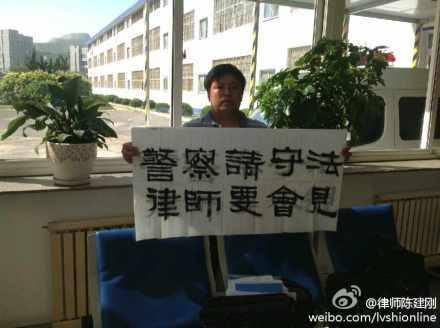11 lawyers in China refused to attend a court session in northeastern China on July 5, defying judicial authorities for what they said was a violation of procedure in a highly charged political prosecution of 13 practitioners of Falun Gong, a spiritual practice that has been persecuted in China since 1999.
The hearing was at 8:30 am at the Zhongshan District Court in Dalian City. Chinese criminal procedure requires that defendants be notified to appear at court three days before the scheduled day. However, none of the defendants received such a notice, prompting their lawyers to state that the court had opened a session illegally, and thus they will not attend, according to a report by New Tang Dynasty Television.
Last July, 79 practitioners of the spiritual discipline were detained by Dalian authorities for installing satellite dishes for residents to receive NTD Television, an independent, New York-based Chinese-language broadcaster that frequently reports on the persecution of Falun Gong and other human rights abuses in China. More than 10 were sentenced to forced labor camps. One practitioner and a relative has died in the aftermath, while 13 practitioners were accused by Dalian authorities of being “technical staff” who “used an evil religious organization to undermine the implementation of the law,” according to a report by NTD.
The charge, known as Article 300 of the criminal law, has been used to prosecute many Falun Gong practitioners, and has been condemned by Chinese lawyers for its vague wording and lack of legal jurisdiction.
Liang Xiaojun, a lawyer on the defense team for the Dalian case, said in an interview with NTD that this charge is problematic because based on law, the practice of Falun Gong is still legal in China.
“In Chinese law, there is not a single article that prohibits the practice of Falun Gong.” At the National People’s Congress meeting in 1999, a legislation was proposed, “but it cannot be implemented or applied because it is like a propaganda slogan. It was just a decision, and it did not mention ‘Falun Gong’ specifically.”
Liang also said the charge has no application to the Dalian practitioners’ installation of satellite dishes. “First of all, watching NTD Television is a citizen’s right, it is the right to free information. This is what every citizen in a civil society should be able to enjoy. When you look at this matter [of installing satellite dishes] and this criminal charge of ‘using an evil religious organization to undermine the implementation of law,’ they are completely unrelated things. From a legal perspective, this charge itself has major issues, because you are using the law to restrict religious belief, and this is surpassing the realm of law.”
The Chinese regime has untold numbers of Falun Gong practitioners in forced labor camps and in prison, where they are physically and mentally tortured, sometimes to death, according to research by human rights organizations. According to the Falun Gong website Minghui.org, more than 3,600 are confirmed to have died from the persecution.
The first hearing for this case was scheduled for April 12 this year, but the defense lawyers were only notified the night before that it was to be postponed. On the day of the hearing, relatives of the Falun Gong practitioners who gathered at the courthouse to attend the hearing were arrested and detained by the police, along with two of the lawyers on the legal team defending the practitioners. One of the lawyers, Cheng Hai from Beijing, was also beaten by police.
At the next hearing on June 21, the 11 lawyers defending the practitioners were prevented by public security forces from entering the courthouse. Plainclothes police and police vehicles barricaded the entrance. Two Falun Gong practitioners who attended to the lawyers’ travels were also arrested and detained that day, according to a report by Minghui.org.
The case is proving to be a headache for Chinese judicial authorities, who have arbitrarily and easily sentenced Falun Gong practitioners in the past. During the June 21 court session, the court relented to the defense lawyers, who requested that the Falun Gong practitioners not wear prison clothes, as they were not yet convicted of any crime. 12 hours later, when lawyers protested that the health of their clients was too poor to continue, the hearing was adjourned without result.
Defense Lawyers Reject Court Hearing Of Dalian Falun Gong Case
11 lawyers in China defending Falun Gong practitioners refused to attend a court session in northeastern China on July 5, citing the court’s failure to follow proper legal procedures.

Chinese lawyer Chen Jiangang holds up a banner asking Dalian City police to meet with him and other lawyers defending 13 Dalian Falun Gong practitioners, who were charged for setting up satellite dishes in local residences. On July 5, Chen and 10 other lawyers on the defense team refused to attend the latest court hearing on the case, citing the court’s failure to follow proper legal procedures. Weibo.com
|Updated:




